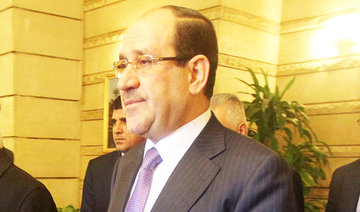BAGHDAD: Iraqi Prime Minister Haider Abadi has signed an electoral pact with leaders of the Shiite-dominated Popular Mobilization Units (PMU) to jointly contest parliamentary and provincial elections in May.
Gaining PMU support is crucial for Abadi to win a comfortable parliamentary majority and form the next government.
Abadi had been in coalition talks since Thursday with Al-Fattah Alliance, a group of the most powerful Shiite armed factions led by Hadi Al-Amiri, commander of the Badr Organization, in addition to the Iraqi Islamic Supreme Council and other political parties.
The result was the formation on Saturday of the Victory of Iraq Alliance, which will be led by Abadi, who will also head the electoral list in Baghdad. Al-Amiri will be head of the new electoral alliance’s central coordination committee.
“We intend to correct the political path and adopt professionalism and experience, away from corruption,” the new coalition said.
Victory of Iraq brings together the most powerful political and armed Shiite factions who fought Daesh alongside the government under the umbrella of the PMU, its leaders said.
“We expect that this alliance will gain the trust of the Iraqi people. We hope it will draw the path for the next stage of Iraq’s progress,” Ali Al-Alaq, one of Abadi’s advisers and negotiators, told Arab News.
Commanders and fighters registered on the PMU payroll are not allowed to run for election, but the 140,000 fighters, their families and their supporters represent a huge electoral base that all Iraqi politicians are keen to appeal to.
In return, the PMU leaders have been seeking guarantees that the next prime minister will not target them or threaten their existence.
“Abadi is the strongest nominee right now and his chances of staying in office as prime minister are high, so it is the best choice to ally with him,” a PMU commander told Arab News.
“We offered him votes and support and he offers us protection. Allying with him is in both our interests.”
Earlier on Saturday, senior politicians told Arab News that efforts by Sunni political groups to postpone Iraqi elections will fail because of the constitutional timetable.
The Union of Forces, the largest Sunni parliamentary bloc, has demanded a delay in the elections for at least six months until the areas liberated from Daesh militants are cleared and reconstructed and displaced people return home.
“There are real justifications to postpone the election. Most displaced people have not come back home and they have been living in tents until today,” said Ahmed Al-Salmani, a member of the Union of Forces bloc.
“The infrastructure of most of the liberated towns and villages has not been restored, so people cannot go back home.”
Almost a third of the Iraqi territories in the north and west parts of the country which dominated by Sunnis, had fallen into the hands of Daesh militant in the summer of 2014. Iraqi has declared the full liberation of its militants- seized lands and end of the three years’ war against Daesh last month.
Most of the liberated areas are widely impacted by the militancy and the military campaigns launched by the Iraqi government to liberate these areas. Around two million people are still displaced and cannot back home mainly due to the lack of security and the daily basic services in their towns.
Under the Iraqi constitution, the legislative period extends for four calendar years, starting with the first session. A new parliament should be elected 45 days before the end of the previous legislative period. The Iraqi Cabinet and the Higher Election Commission have agreed on May 12 as the date for both the parliamentary and provincial elections
“The date of elections is determined by the constitution and not by personal judgment,” Hussein Al-A’awad, a member of Al-Ahrar parliamentary bloc, told Arab News.
“Anyone who wants to delay the election has to prove that there are real obstacles and threats, and in that case, they have to sit and fix it. Otherwise, both sides have to go to the federal constitutional court.”
Sunday’s parliamentary session is expected to end the discussion with a vote on the date of the election.












